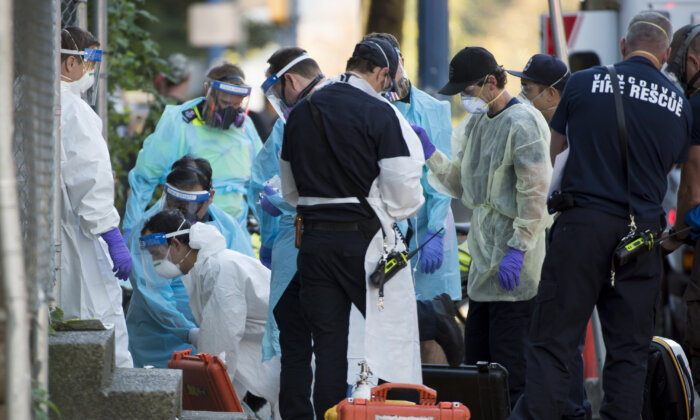Examination of BC’s Path to Drug Decriminalization and Its Reversal
British Columbia has taken a step back in its drug decriminalization pilot, the latest twist in its decades-long push for more and more permissive approaches to drugs.
Its guiding idea has been that destigmatizing drug use is the key to helping addicts, but it has long faced pushback on this approach due to public safety concerns.
History is repeating itself in a way, with current events mirroring the province’s experience throughout the 1990s and 2000s. But the situation has intensified—it’s not just about needle exchanges or designated injection sites anymore. Now, it’s about rampant drug use in all sorts of public places, hospitals included.
The public backlash is greater, and the number of overdoses have climbed.
But on April 26, Mr. Eby asked Ottawa to urgently amend its exemption. He wants to prohibit all public drug use, empowering police once again to take action when drug use impacts public safety.
In her first public comments following Mr. Eby’s request, Federal Health Minister Ya’ara Saks said it’s too soon to tell whether decriminalization is working, and she spoke in favor of the pilot’s continuation.
“The overdose crisis, as I’ve said before and I say again, is a health crisis issue. It is not a criminal one,” she told reporters on April 29. She said the premier’s request is under review.
B.C. has been on a trajectory of decreasing drug regulation for decades, and the coming months will tell to what degree that will be reversed.
B.C. tends to influence the rest of the nation as well. Its harm-reduction approach, including supervised-injection, spread beyond its borders, and so has decriminalization.
Toronto would decriminalize all drugs, not just those listed in B.C.’s exemption. It would apply to people as young as 12, unlike B.C.’s policy that applies to adults only. It would not set a limit, such as B.C.’s 2.5 grams, but would broadly decriminalize “personal possession.”
Mr. Eby told reporters on April 29 that other jurisdictions can learn from his province’s difficulties.
“There are important lessons to be learned on where we are to date, that don’t need to be repeated,” he said.
The First Whispers of ‘Decriminalization’
In 1997, Vancouver declared a public health emergency in its Downtown Eastside due to a spike in overdose deaths, mostly from heroin. Deaths province-wide had surged from 39 in 1988 to 357 in 1993, many of them in Vancouver. And they remained high, peaking in 1998.
It was in the ‘90s that Canadians first heard the call for “decriminalization.”
The province didn’t go that far, but it did create the first supervised injection site in North America in 2003.
Stephen Harper’s Conservatives fought against it after they were elected in 2006, withdrawing federal funding and attempting to shut down the site. “We as a government will not use taxpayers’ money to fund drug use,” Mr. Harper said in 2006.
Vancouver police, as well as property and business owners part of the Community Alliance, also spoke out against this harm-reduction approach.
The evidence of benefits or downfalls of Vancouver’s approach were debated all along. Harm-reduction was aimed not only at destigmatizing drug use but also at reducing blood-borne illness transmission through sharing needles.
The rise of fentanyl made a bad situation worse.
The Current Crisis
In 2016, the province declared a public health emergency—this time it was province-wide rather than limited to Vancouver’s east end as before, though the majority of deaths were still concentrated in Vancouver. Overdose deaths reached 922 that year and more than 14,000 have died since.
This time, the call for decriminalization took hold. The pilot began in January 2023 and is set to expire in 2026. The stated purpose of decriminalization is to reduce stigma so people won’t hide their addiction. Advocates say it will prevent addicts from racking up a criminal record, a barrier to employment. Proponents say it could also decrease addicts’ mistrust of authorities and make them more likely to seek help.
But, at the same time, public drug use has become a problem no longer contained to Vancouver’s east end. It has spilled out into the city at large and into smaller municipalities across the province.
“It seems like there isn’t a consideration for the whole community,” he said. “Children needed safe spaces as well.”
In New Westminster, B.C., city councillors also raised the alarm last year.
Mr. Eby has said he hopes his current efforts will get around this by having the regulation come from Health Canada.
This recalls the Harper government’s opposition to supervised injection and the Supreme Court’s decision to block it. Just as federal Conservatives were opposed to harm-reduction initiatives in the 2000s, Conservative Leader Pierre Poilievre is a staunch critic of decriminalization today.
Outcry Ramps Up
Pushback on decriminalization ramped up significantly in April.
“Nurses face a daily reality of drug-fueled violence, from having drug smoke purposely blown in their faces to being kicked, punched, shoved,” BC United MLA Elenore Sturko said.
“So, if you have someone who is with their family at the beach, and there’s a person next to them smoking crack cocaine, it’s not a police matter,” she said.
“What we’re doing isn’t helping people. It’s also destroying our neighborhoods, so we have to stop the insanity,” Richmond Councillor Alexa Loo told The Epoch Times on April 23.
“We haven’t seen any improvement on the number of people dying from the drugs, the number of people using the drugs, and the number of encampments in our communities. It’s become worse, not better.”
In addition to decriminalization, B.C. has strongly supported safer supply as a way to combat the overdose crisis.
Source link
- Legal analysts warn that imprisoning former President Trump could spark widespread demonstrations
- Trump: Netanyahu Justifiably Criticized for Oct. 7 Attack





